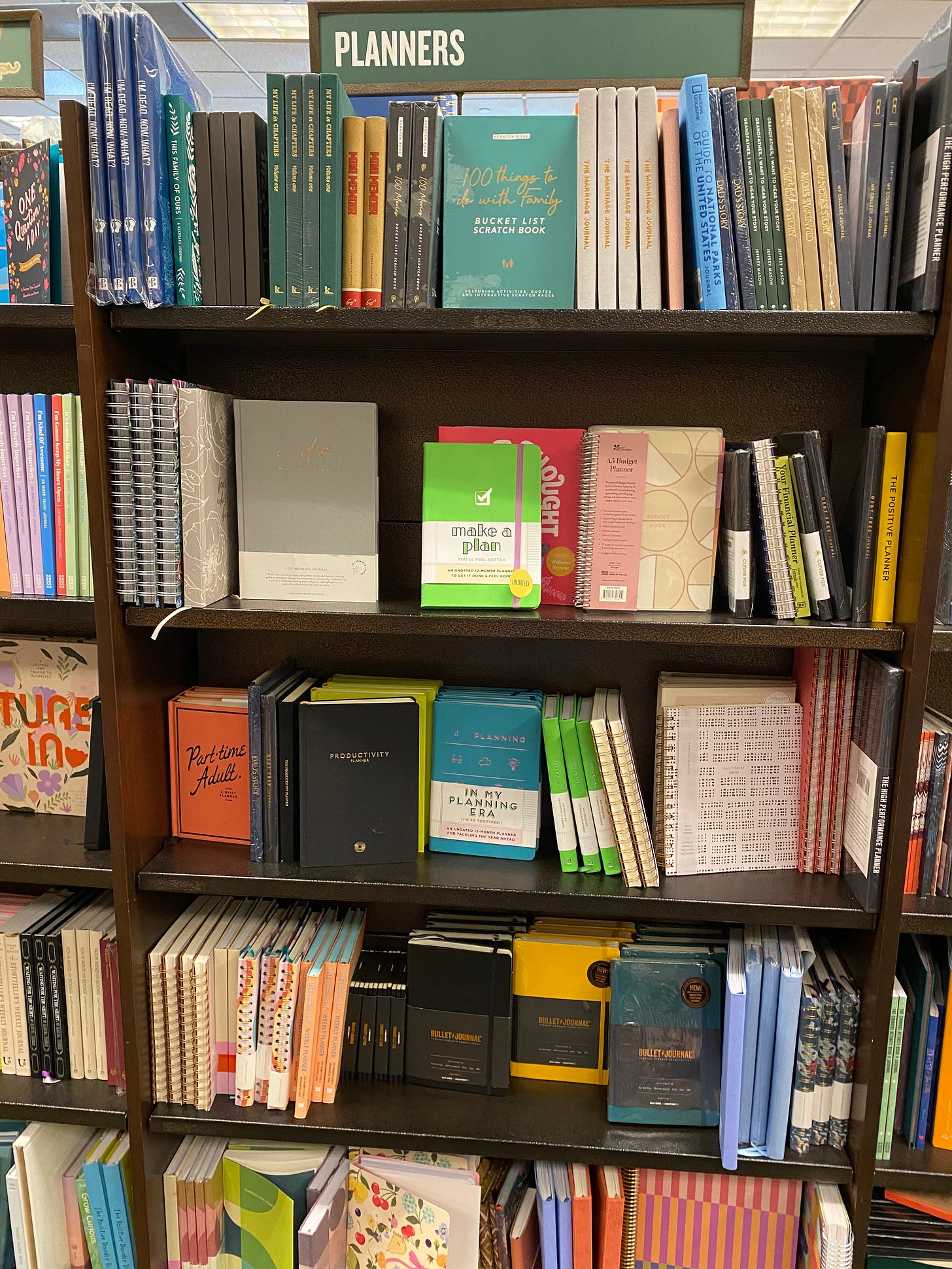This is an essay (I’ve just been reading about the death of these, ushered in by our friendly chatbot AI). It is part of my plan for a year of Writing without Surveillance, a Sabbatical.
I could also use keywords here: Mormonism; Academia; Genealogy. I suspect we’ll hear more about all of these. first a note about Self-Help:
1. Self-Help (see Samuel Smiles’ book of 1859 of that title)
fits perfectly with the neoliberal “it's up to you” to adjust to norms of achievement.
In some of its roots, including Smiles’ lectures to working men’s improvement associations, it can mean uplifting with mutual aid, all together.
It often takes the form of series of exemplary stories of success.
Just some of the mostly-blank books for purchase in a Barnes & Noble in 2025.
Years ago, I wrote about Covey’s Seven Habits of Highly Effective People (a major producer of such aids to planning your time, based in Mormon-majority Orem Utah), and about Margaret Thatcher and others reviving a Victorian ideal of the deserving poor.
I bought a planner because I am so weary of Outlook, and cognitively perceive dates better in paper formats.
Journaling as theraphy, a secular vade mecum.
2. Mutual Improvement Associations.
The earliest Mormon missions were, reasonably enough, to English-speaking Christians in North America and the UK. I will come back to the matter of Mormon missions.
Both my parents’ families were from lines of converts who walked across the plains to Utah, more in the 1850s (not the first party with Brigham Young). We can trace all the ancestry because the whole lot were record-keeping, literate, self-improving folk. I think almost all of them were working class, mostly Lancashire textile millworkers. They already knew the Bible. They didn’t know how to farm.
The new story they came for was had a geographical magnetism: a version of Swendenborg plus a great narrative about the role of the New World (hemisphere, not just North America) in the divine plan. My LDS theology is very amateur, remote. I hazard here that 1) a three-part heaven that nevertheless is rather close to mundane home 2) a promise of improvement, infinitely. As God was, so shall you become.
Bushman, Mormonism: A Very Short Introduction has been useful.
So I get really interested in the importation of Lancashire social practices along with the converts.
I know I went to Primary when I was living with Grandma Booth Davis and step-Grandpa Ray J. Davis in Pocatello Idaho when I was 9. I really think MIA was also current, that is, Mutual Improvement Association, holding dances for teenagers, for example. Sunday afternoon services that I did attend in Chicago or Utah or California as I remember them resemble middle-class Literary Society salons of the later nineteenth-century, Boston or Manchester.
It’s easy to assume all this was willfully blinding and binding and hypocritical. What I know of my relatives suggests that they were not only cheerful but had a sense of humor and perspective. Before my lifetime, there was far more leeway about the Word of Wisdom. My sister recently said she thinks that Great-Grandfather Barnes drank beer. I just know that my own parents, the members of their respective families who left the Church, hid the coffee when my grandparents came to visit.
A story to illustrate this dip-in-the-water post about vast family and religious histories:
I was reading up on the founding of the Young Women’s Mutual Improvement Association for the LDS church. I read the name Merry May Booth Talmadge among the board members, in the 1900s. Yes, I checked, May Talmadge was the sister of Robert Ebenezer Booth, my grandfather Wayne Chipman Booth’s father. So my great great aunt.
My mother, 99 this year, of the Strongs and Barnes’s, knows the story: May Booth Talmadge lost her elderly husband, who was one of the Apostles to President Heber J. Grant (LDS). Grant paid a visit of condolence on Talmadge’s death and asked her how she was doing. She replied, “Old age is a sonofabitch.” I asked Mom, do you think Heber J. Grant laughed? Yes, Mom says. That’s how the story is told: right up there in the highest echelons, a celebrity connects to everyone’s mutual pain. It’s not for sissies.




Again - our respective reports on our respective grand parents and great gp’s make us know that ‘we’ve come a long way baby’ and yet still it’s fascinating. thanks
"Essay" as in "to attempt." I also see typos--I gather one can edit after posting, as I see some people's posts marked "edited."
Mom likes it better if May Talmadge said, "Heber, old age is a son of a bitch." It's the grand personage who hears the oath that makes the anecdote. (There is a Utah city named Heber.)